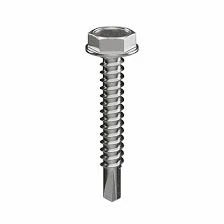self drilling screws for aluminum
Self-Drilling Screws for Aluminum An Essential Guide
When it comes to fastening materials, particularly metals like aluminum, the choice of screws can greatly impact the durability and integrity of the assembly. One of the top choices among professionals and DIY enthusiasts alike is self-drilling screws specifically designed for aluminum. This article will explore what these screws are, their advantages, and important considerations for their use.
What Are Self-Drilling Screws?
Self-drilling screws, often referred to as Tek screws, are specially designed fasteners that can drill their own hole as they are driven into a substrate. This characteristic makes them particularly advantageous in applications where traditional screws would require pre-drilled holes. Made from high-strength materials and often coated for corrosion resistance, self-drilling screws are engineered to penetrate materials like aluminum quickly and efficiently.
Advantages of Self-Drilling Screws for Aluminum
1. Time Efficiency One of the primary benefits of self-drilling screws is the time saved during assembly. There’s no need for pre-drilling, which can significantly reduce the time taken to secure materials. This is particularly advantageous in large projects where countless fasteners are needed.
2. Increased Structural Integrity These screws create precise holes that result in a secure fit, decreasing the likelihood of loosening over time. The tight connection is especially important for applications involving structural components where safety cannot be compromised.
3. Versatility Self-drilling screws come in a variety of sizes, lengths, and head types, making them suitable for a wide range of applications. Whether you're working on a construction project, automotive assembly, or home repairs, there’s likely a self-drilling screw that fits your needs.
4. Reduced Risk of Damage Given their design, self-drilling screws minimize the risk of damaging the material being fastened. They produce less stress on the aluminum compared to traditional screws that require pre-drilling, which can create cracks or fractures.
self drilling screws for aluminum

Considerations When Using Self-Drilling Screws
While self-drilling screws offer various advantages, there are considerations to keep in mind to ensure optimal performance
1. Material Thickness It’s crucial to choose screws that are appropriate for the thickness of the aluminum material being used. Using screws that are too long can cause them to penetrate too deeply, potentially causing damage.
2. Drill Point Design The drill point of the screw is designed for specific materials. Ensure that the drill point is compatible with aluminum to achieve the best results. A screw with an inappropriate drill point may not create a clean hole and might lead to poor fastening.
3. Corrosion Resistance Aluminum can be susceptible to corrosion, especially in certain environments. Opt for self-drilling screws that come with a corrosion-resistant coating or are made from materials that can withstand environmental elements, further extending the lifespan of your assembly.
4. Torque Requirements Pay attention to the torque when driving in self-drilling screws. Over-tightening can lead to stripping the screw or damaging the aluminum, while under-tightening may result in a weak connection.
Conclusion
Self-drilling screws for aluminum are a game-changer in the fastening landscape. Their ability to combine drilling and fastening into one step streamlines the assembly process while providing a robust connection. By understanding their advantages and keeping essential considerations in mind, users can utilize these screws to enhance the quality and durability of their projects. Whether you are a professional or a DIYer, investing in quality self-drilling screws will undoubtedly yield positive results in your aluminum applications.
-
Weatherproof Plastic Expansion Anchors for OutdoorNewsJun.06,2025
-
Sustainability in the Supply Chain: Eco-Friendly TEK Screws ProductionNewsJun.06,2025
-
Load-Bearing Capacity of External Insulation FixingsNewsJun.06,2025
-
Double Head Bolts: Enhancing Efficiency in Industrial MachineryNewsJun.06,2025
-
Corrosion Resistance in Chipboard Screws: Coatings for Wholesale DurabilityNewsJun.06,2025
-
Butterfly Toggle Bolts : Enhancing Structural ResilienceNewsJun.06,2025
